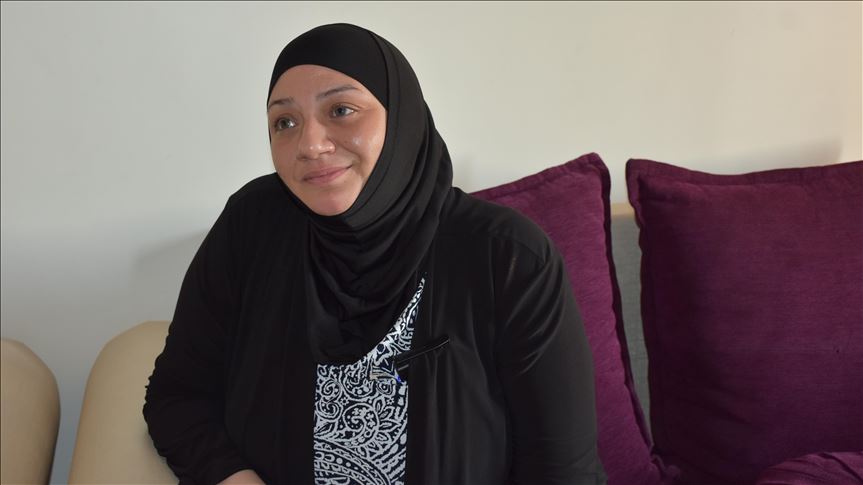
'Despite years passing since her release, a woman who was jailed by the Syrian régime keeps the memory of her ordeal alive in order to help other women like her who struggle after escaping prison.
Speaking to Anadolu Agency, Sundus Fulfule said she was pregnant when she entered Adra prison in Damascus on May 16, 2011, which is when her life turned upside down.
Before that, Fulfule was living in Latakia, where she was teaching Islamic law to grade 10 and 11 students as a theology graduate. She also graduated from nursing school.
After 11 months of incarceration, she had to provide for her daughters in a new environment and became involved in humanitarian aid work.
"Obviously, in the Syrian revolution, the weakest ones are women and children, so I have chosen to work in this direction. Every day, I would make new experiences, train women and give them psychological support," she said.
She said the most vulnerable ones are women who were released from prison.
"Women who survive prison need all kinds of support, such as economic and psychological as well as shelter."
She said she works with many women who were victims of rape, noting that no one takes care of them properly.
"There are too many cases to count, and they continue to rise," she said, calling for immediate action for women who continue to be exposed to sexual violence and incarceration.
According to the Conscience Movement, an international nongovernmental organization, more than 13,500 women have been jailed since the Syrian civil war began in early 2011, while more than 7,000 women remain in detention, where they are subjected to torture, rape and sexual violence.
The movement is an alliance of individuals, rights groups and organizations aiming to secure urgent action for the release of women and children in the prisons of the Syrian régime.
The Syrian Network for Human Rights (SNHR) announced Wednesday that more than 14,070 civilians have died of torture by forces of the Bashar al-Assad régime since the beginning of the civil war, including 173 children and 45 women.
When the revolution started in Syria’s southwestern Daraa province, Fulfule said that women in Latakia were inspired by this and began taking to the streets to hold peaceful protests.
"With our manners and morals, without disobeying our state, we started protests. We only demanded change and improvement and called for ease of detention procedures. In the beginning, these protests were not carried out for the fall of the Assad régime," she said.
She said the demonstrations would call for the rights of arrested people, justice and the increase of salaries.
Recalling the day she was arrested, the 40-year-old said she was attending a peaceful protest staged by women.
"All of a sudden, the entrances and exits of the area we were in were closed, and men started to join the protest and together with them also intelligence security forces," she said, which is when they detained her.
"Once the investigation started, we understood that everything was prepared already, including the accusations against us," Fulfule said, noting she was accused of terrorism.
"When I was arrested, my first daughter was eight months old and I was pregnant [with a second child]," she said.
After spending four months in prison, her family was falsely informed by régime soldiers that she had died.
"My birth contractions started and they took me to a military hospital," she said.
Fulfule used this opportunity to ask a nurse to call her family.
"Thankfully she helped, and I called and told them I’m alive."
After giving birth in the hospital, she was transferred back to prison.
She witnessed every kind of abuse against other inmates, from human rights violations to sexual abuse.
"When they wanted to torture someone, they would take them to the [prison] corridor. The sounds of torture and smell of burnt skin were everywhere," she said.
"Frankly, I didn't witness rape [of other inmates] with my own eyes, but I saw the results of it -- pregnancy," she said.
"Most of them gave birth in prison and got out, hiding their babies from everyone.”
When she reached out to her family, they spent a large amount of money to bribe the prosecutor at the time.
"After 11 months, I could walk out [from prison]."
"Nothing I've experienced during the time in prison was as difficult as my child not recognizing me," she said, adding her daughter was nearly two years old when she saw her again.
Speaking about the struggles she faced as a woman released from prison and the neglect from her husband, Fulfule told of her migration to northern parts of Syria.
"One of the things which affected me the most was my husband not accepting me. 'You deserved it. Who told you to attend protests?' he said. I took my children [and left].”
When she was released, she could no longer return home and had no choice but to escape the region as the intelligence security forces were still searching for her.
Noting that the Syrian conflict had entered its ninth year, she expressed her main concern: the future of her children.
"My only fear now is the future of my children," she said.
"I don’t want my children to be in this situation. I want them to live a beautiful life in a safe environment." '





